Ethereum Wallets - An Overview
Which Wallets are out there ?
For which purpose and system ?!

The following Ethereum Wallets should be sufficient to satisfy most users claims and needs.
But If we look at Bitcoin's several different Wallets for all requirements and systems,
Ethereum seems a bit underdeveloped in this area of application.
Real clients / Full Nodes
As with Bitcoin, "real clients" at Ethereum represents Full Node in the network.
This is the most independent and most direct way to interact with the network and allows the full use of all functions of Ethereum, especially the interaction with Smart Contracts.
If you want to use Ethereum properly, one of these Clients is recommendable and is a suitable way to go.
However, the price for this is a considerable need of computer resources
The two most popular and best developed real Ethereum clients are "Geth" and "Parity".
Geth Client
The Ethereum implementation in the language Go is strictly speaking the official client of Ethereum.(https://github.com/ethereum/go-ethereum/wiki/geth)
Nearly 20,000 Geth Nodes are the backbone of the Ethereum network.
(https://www.ethernodes.org/network/1)
When the Ethereum developers agree on new features, they are usually implemented first in Geth (such as Swarm).
Geth's code defines the consensus of Ethereum.
"Mist"
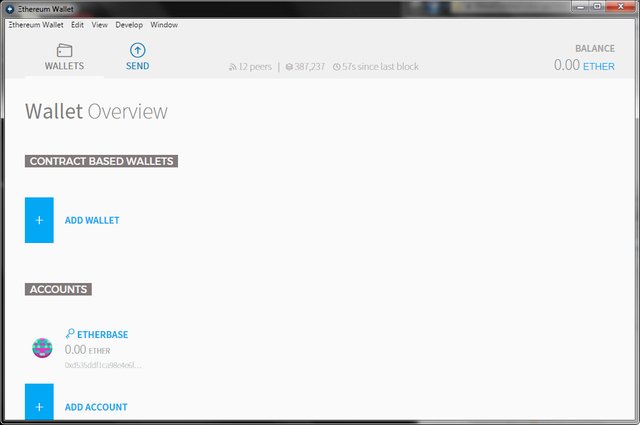
Geth is usually runned via terminal.
But If you want to use Geth as a Wallet with a graphical user interface,
you can use "Mist" , with the Ethereum Wallet and the "Web3 Browser".
https://github.com/ethereum/mist/releases
In addition to Ether, this also displays tokens and allows to observe, write and publish smart contracts.
However, Geth requires relatively much computing power, and it takes very long before Geth has loaded the entire blockchain.
After all, the "geth --fast" mode is significantly faster.
Nevertheless, Geth is relatively heavy usable for the user.
Parity Client

The second most popular client of Ethereum, Parity, is written in the programming language Rust.
Compared to Geth, it impresses with a much better performance.
If you start Parity, you will notice that the client requires a lot of computing power.
But Parity is ready for use in just a few minutes.
This is due to the "--warp" mode, with which Parity builds the state using the other parity nodes.
By default, Parity runs in Light mode, which limits the need for hard disk space.
(https://parity.io/)
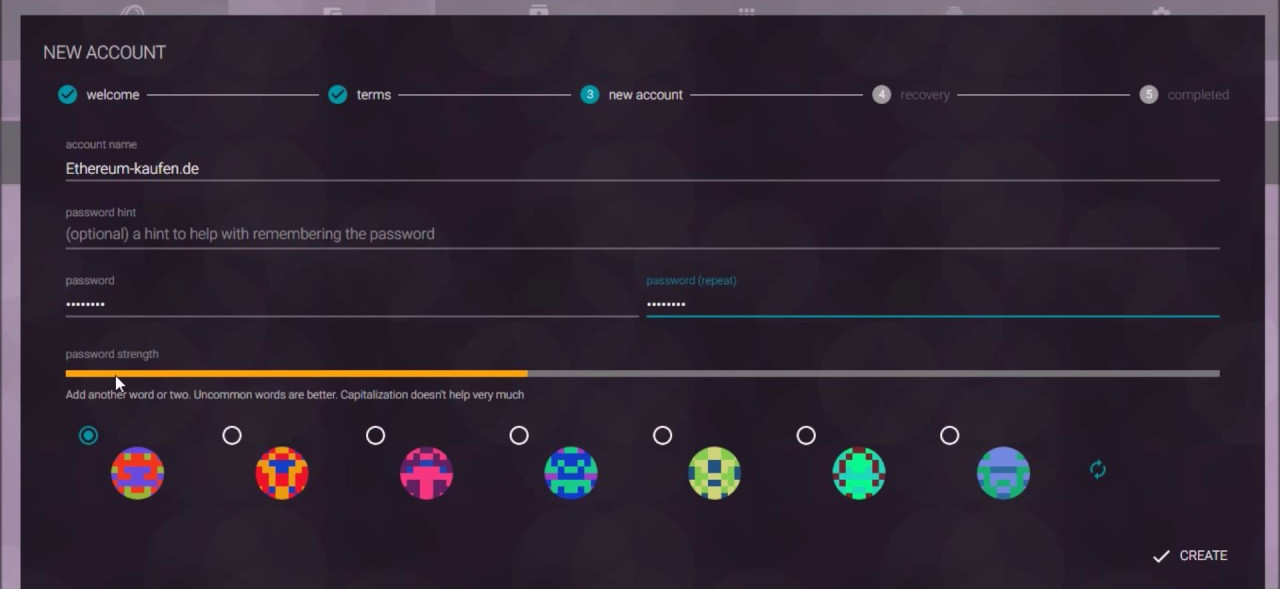
If Parity is on, you will find a graphical user interface in the browser at the address "127.0.0.1:8180/".
This has the same functions as the Ethereum Wallet on Geth and goes partly beyond.
Thanks to the lower resource consumption, the fast loading time and wide functionalities, Parity is, in my opinion, currently the most impressive client in the entire crypt-growth universe.
Light Wallets
Of course, it is not everyone's business to run a real client.
It is also not necessary to receive and transmit Ether and ERC20 tokens.
For this purpose, light wallets are generally perfectly adequate.
Contrary to Bitcoin, where there are an abundance of light wallets, Ethereum is still very weak in this respect.
The two main lightweight wallets are "MEW" and "Metamask".
(MEW) MyEtherWallet

Actually, MyEtherWallet is an online wallet.
It is an interface through which users can take relatively simple contact to full Ethereum nodes to receive and send ether.
MEW also supports the most common tokens on an ethereum basis.
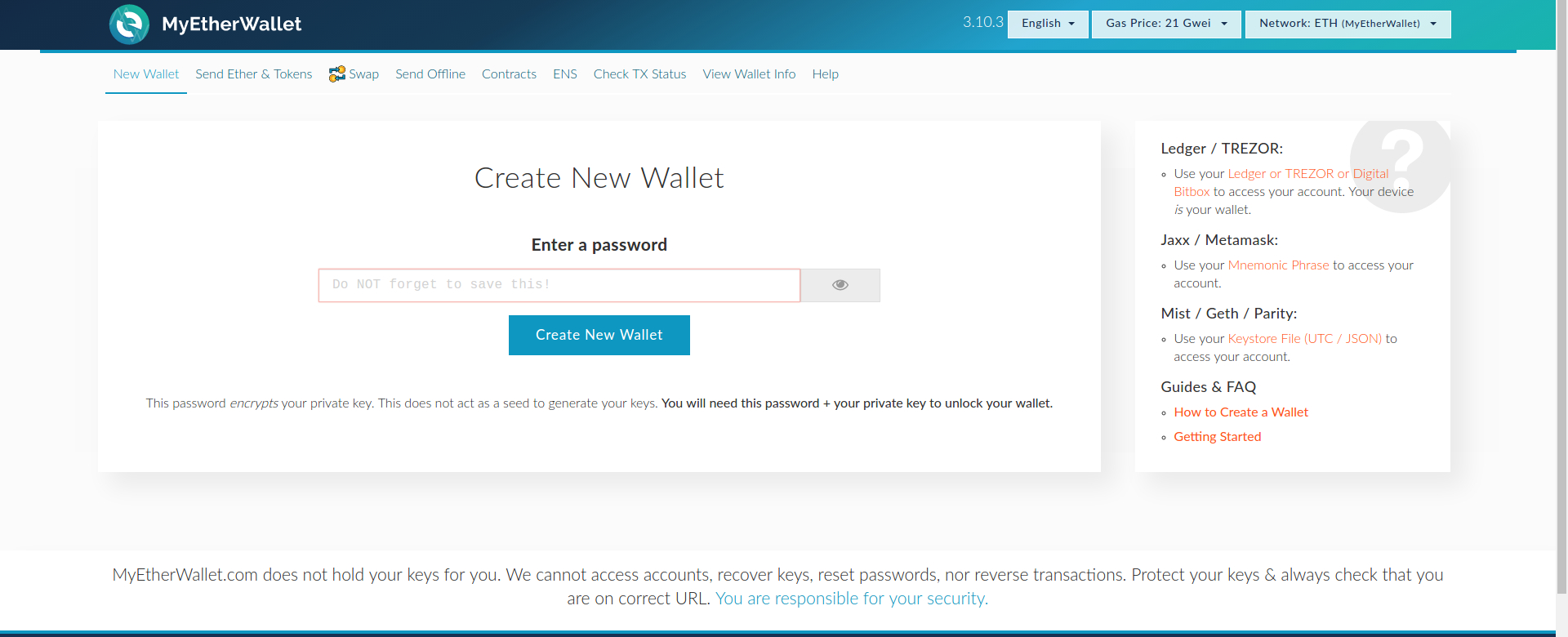
If you do not want your wallet to run on a foreign server, MEW can run the function "available offline" within the browser.
Because MEW works independently from the server, you can also use the wallet locally, like similar wallets for Bitcoin.
This combination of easy usability, independence from a third party and relatively wide functions makes MEW the most popular Ethereum wallet.
Metamask

Metamask is a plugin for the Chrome browser.
It brings a minimalistic wallet into the browser, with which you can receive and send ether and some tokens.
The wallet is very simple, but fulfills the basic functions.
The developers have been planning for quite some time to offer the Wallet also for Firefox and other browsers, but so far it only works with Chrome.
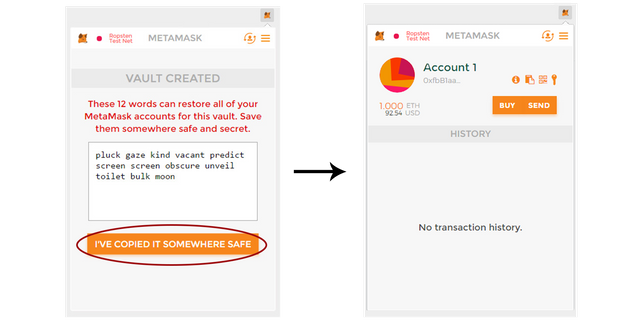
Hardware Wallets

Many users prefer hardware wallets to store their coins or token securely.
All current hardware wallets now support Ethereum.
Most popular is the Ethereum app from Ledger. But also Trezor has made many friends in the Ethereum scene with the integration of the backend of MyEtherWallet.
So if you have a Wallet of Trezor or Ledger, you can upgrade it comfortably for Ethereum.
The functionalities are, of course, limited in comparison to a full client.
But thanks to the interface to the MyEtherWallet software, Trezor can capture the most important Ethereum tokens, while the Ledger developers are accustomed to be flexible, recognize trends and quickly get into the wallet.
Multiwallets
More and more wallets are able to manage a variety of virtual currencies.
That Ethereum is one of the preferred currencies besides Bitcoin is obvious.
Here we present two Wallets which include ether and many other crypto currencies or Token.
"Jaxx" and "Exodus".
Jaxx

There should be no wallet that supports as many coins and systems as Jaxx.
Besides Bitcoin and Ethereum, you can also use Dash, Ethereum Classic, Zcash, Litecoin and more with Jaxx.
Also some ERC20 token - like REP from Augur - work with Jaxx.
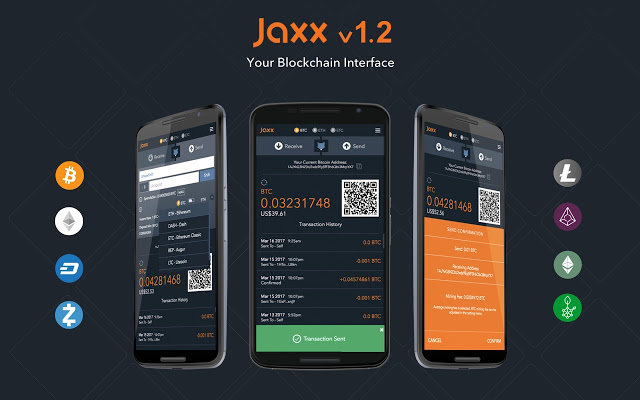
Jaxx is a great choice for many Ethereum fans, because of the breadth of the supported devices and systems: Jaxx runs on Windows, Linux and iOS, on computers, tablets and smartphones, as well as in the browser.
For many, Jaxx is the most convenient wallet to store Ethereum on the smartphone.
Exodus

The second large multicoin wallet is exodus.
In addition to Bitcoin, Ethereum, Dash and Litecoin, Exodus also supports a large number of toes based on Ethereum: BAT, Augur, EOS, OmiseGO, Qtum and more. This is likely to make Exodus extremely attractive to many ICO fans.
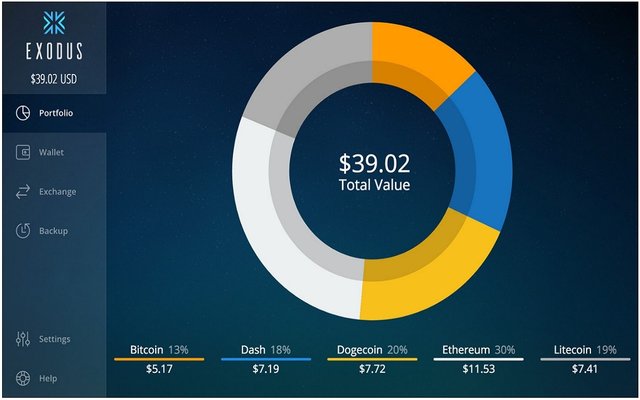
Exodus also convinces with a relatively simple and transparent key management as well as a nice design.
But the downside is that not all parts of the Wallet software are open source and that Exodus runs only on the PC.
Paperwallets
Ethaddress
With the Seeds of Ledger, Trezor, Exodus and Jaxx as well as with MyEtherWallet one can build relatively simply a Paperwallet.
However, there is also a page that is specifically designed to form Ethereum paperwallets.
For me the site has not worked, either online or offline. But maybe you're lucky.
But of course there are unlimited individual options to create Paperwallets.
Mobile Wallets
imToken

"ImToken" is probably the first Ethereum wallet for Android and iOS.
It was written by the Chinese Ethereum developers of ConsensLab and is, unfortunately, not completely open source. However, imToken convinces through the integration of a multitude of tokens, a seed as well as the possibility of multisig wallets.
Experimental
In addition, of course there are some more wallets that are currently under development and are still in a somewhat experimental phase.
Xeth

Perhaps the most promising project is Xeth.
Xeth is an Ethereum wallet that dockes with an existing Ethereum installation and synchronizes with it.
Xeth uses the decentralized namespace BitProfile and allows it to receive ethers without ethernet addresses.
(http://bitprofile.org/)
In addition, Xeth allows stealth addresses for Ethereum.
However, both are still in the experimental phase, which is why Xeth currently does not offer so many advantages over Parity.
Except for more convenient, possibly an even more private interface to send and receive ether, and a better overview of past transactions.
Leth
Leth is a still experimental mobile ethereum wallet.
It is currently running in the Testnet and the developers do not recommend using it for larger amounts.
Leth promises an exceptionally broad range of options for a mobile wallet, which may include the management of various tokens as well as the interaction with other smart contracts.
References:
https://github.com/ethereum/go-ethereum
https://github.com/ethereum/mist/releases
https://parity.io/
https://github.com/paritytech/parity
https://www.myetherwallet.com/
https://metamask.io/
https://www.ledgerwallet.com/
https://trezor.io/
https://jaxx.io/
https://www.exodus.io/
https://token.im/
http://xeth.org/
https://www.inzhoop.com/
https://github.com/inzhoop-co/LETH/projects/1
https://bitcoinblog.de/2017/09/06/wallets-fuer-ethereum-eine-uebersicht/
https://www.ethereum.org/
(always check URLs !
make sure you are safe while using sensitve data and experiencing the ethereum network)

I would like to buy Hardware Wallet but I have no idea about it?
i would recommend you the ledger nano s.
but i am not sure how long delivery takes at the moment.
i heard about waiting lists because of high demand
Thanks I will buy it on eBay
Enjoy reviews and insight into some of those listed, had not heard about the ETH so much since I have not invested.
Perhaps this will let me rethink it again @joshbreslauer #WeLoveSteemit connection.
You can use your Ledger Nano S with Parity. Local node + hardware wallet = full control
yes. this is an elegant way of using the ethereum network, light but safe
very nice
Awesome post.
glad you like it
I use Mist, MEW and Exodus. All have worked very smooth for me. I heard blockchain.info now supports Ethereum too
nice.
yes you are right. blockchain.com supports ethereum
https://steemit.com/ethereum/@joshbreslauer/ethereum-support-by-blockchain-com-wallet
My ether wallet also works with the Trezor hardware wallet. You can keep your ether and tokens secured using the Trezor but access them using my ether wallets interface.
right